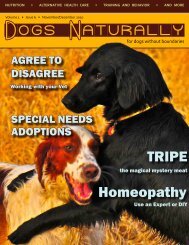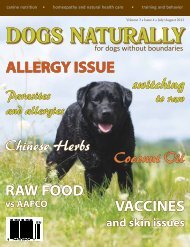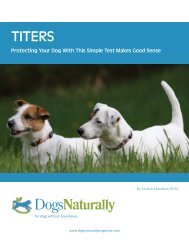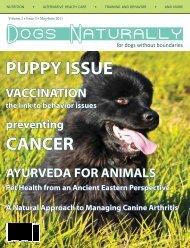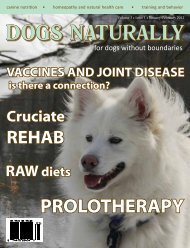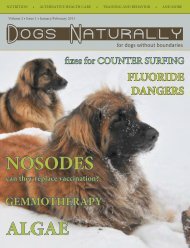Download the PDF Version - Dogs Naturally Magazine
Download the PDF Version - Dogs Naturally Magazine
Download the PDF Version - Dogs Naturally Magazine
You also want an ePaper? Increase the reach of your titles
YUMPU automatically turns print PDFs into web optimized ePapers that Google loves.
puppies had only a 52% chance of<br />
protecting <strong>the</strong>m against parvo. This<br />
means that <strong>the</strong> puppy has all of <strong>the</strong><br />
risk of <strong>the</strong> vaccine but only half <strong>the</strong><br />
potential benefit. At nine weeks of<br />
age, 88% of <strong>the</strong> puppies in <strong>the</strong> study<br />
showed a response to <strong>the</strong> vaccine. At<br />
12 weeks, 100% of <strong>the</strong> puppies were<br />
protected. Some vaccines will provide<br />
protection earlier or later.<br />
Only one dose of <strong>the</strong><br />
modified-live canine<br />
‘core’ vaccine, when<br />
administered at 16<br />
weeks or older, will<br />
provide long lasting<br />
(many years to a lifetime)<br />
immunity in a<br />
very high percentage<br />
of animals.<br />
Vaccinating puppies under 12 weeks<br />
of age, and certainly under nine<br />
weeks of age, for parvovirus is a<br />
high risk, low reward approach. Not<br />
only is <strong>the</strong> parvovirus component of<br />
<strong>the</strong> combination vaccine not all that<br />
likely to be effective, it can actually<br />
work to block <strong>the</strong> effectiveness of<br />
<strong>the</strong> distemper component. It also<br />
makes <strong>the</strong> vaccine more dangerous,<br />
because <strong>the</strong> more antigens contained<br />
in <strong>the</strong> vaccine, <strong>the</strong> greater <strong>the</strong><br />
risk of autoimmune disease (including<br />
allergies, joint disease and cancer).<br />
Moreover, most vets haven’t<br />
seen a case of distemper in years<br />
which begs <strong>the</strong> question: what is <strong>the</strong><br />
big push to start vaccinating puppies<br />
at six to eight weeks of age when <strong>the</strong><br />
parvovirus component is unlikely to<br />
work and it is very unlikely <strong>the</strong> puppy<br />
will come into contact with distemper?<br />
Too often<br />
Pfizer performed an interesting field<br />
study in 1996 where <strong>the</strong>y split vaccinated<br />
puppies into two groups.<br />
Group A received a single vaccination<br />
at 12 weeks and Group B received<br />
a first vaccine between eight to 10<br />
weeks and a second at 12 weeks.<br />
When titers were measured, 100%<br />
of <strong>the</strong> puppies vaccinated once at 12<br />
weeks were protected whereas only<br />
94% of <strong>the</strong> puppies in Group B were<br />
protected – despite receiving two<br />
vaccines as opposed to one.<br />
It appears that <strong>the</strong> first vaccine can<br />
interfere with <strong>the</strong> second vaccine.<br />
So vaccinating your puppy twice not<br />
only doubles his risk for adverse vaccine<br />
reactions, it appears to make<br />
vaccination less effective overall.<br />
Most people – and many vets – believe<br />
that it takes more than one<br />
vaccine to create immunity in a<br />
puppy. This simply isn’t true. It<br />
only takes one vaccine to not only<br />
protect a puppy, but to protect him<br />
for life. After more than 40 years<br />
of testing immunity in thousands of<br />
dogs, Dr. Ronald Schultz has come<br />
to <strong>the</strong> following conclusion: “Only<br />
one dose of <strong>the</strong> modified-live canine<br />
‘core’ vaccine, when administered at<br />
16 weeks or older, will provide long<br />
lasting (many years to a lifetime)<br />
immunity in a very high percentage<br />
of animals.” That very high percentage<br />
is nearly 100%.<br />
The only reason vets give puppies<br />
more than one vaccine is that <strong>the</strong>y<br />
are trying to catch <strong>the</strong> small window<br />
in time when <strong>the</strong> maternal antibodies<br />
are low enough that <strong>the</strong>y will not<br />
block <strong>the</strong> vaccine, but <strong>the</strong> puppy is<br />
young enough that he is not exposed<br />
to viruses in <strong>the</strong> environment. The<br />
point in time when <strong>the</strong> maternal antibodies<br />
for parvovirus wane enough<br />
for vaccination to work can vary between<br />
eight weeks and 26 weeks.<br />
So vets dutifully and mindlessly vaccinate<br />
every two to four weeks – with<br />
<strong>Dogs</strong> <strong>Naturally</strong> <strong>Magazine</strong> | May/June2012<br />
31




